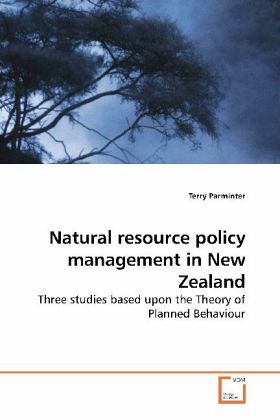
Natural resource policy management in New Zealand
Three studies based upon the Theory of Planned Behaviour
Versandkostenfrei!
Versandfertig in 6-10 Tagen
52,99 €
inkl. MwSt.

PAYBACK Punkte
26 °P sammeln!
Human settlement of New Zealand beginning in the middle of the last millennium contributed towards two thirds of its indigenous wildlife becoming extinct by the millennium s end. Since 1991 in an attempt to halt this decline, central and regional government agencies have worked under the Resource Management Act, together with local communities to develop policies that encourage the application of conservation practices by private landowners. This book provides three examples of such practices and describes how policy agencies can use the Theory of Planned Behaviour to improve the effectiveness...
Human settlement of New Zealand beginning in the middle of the last millennium contributed towards two thirds of its indigenous wildlife becoming extinct by the millennium s end. Since 1991 in an attempt to halt this decline, central and regional government agencies have worked under the Resource Management Act, together with local communities to develop policies that encourage the application of conservation practices by private landowners. This book provides three examples of such practices and describes how policy agencies can use the Theory of Planned Behaviour to improve the effectiveness of their policy strategies by taking into account the needs and beliefs of landowner groups. The three examples enable the author to highlight some of the difficulties of applying this psychological model and how these difficulties may be overcome by understanding the decision making context of the people involved. This book is particularly useful for managers in policy agencies interested in taking a theoretically informed approach to communication and extension strategies for encouraging human and social change.












